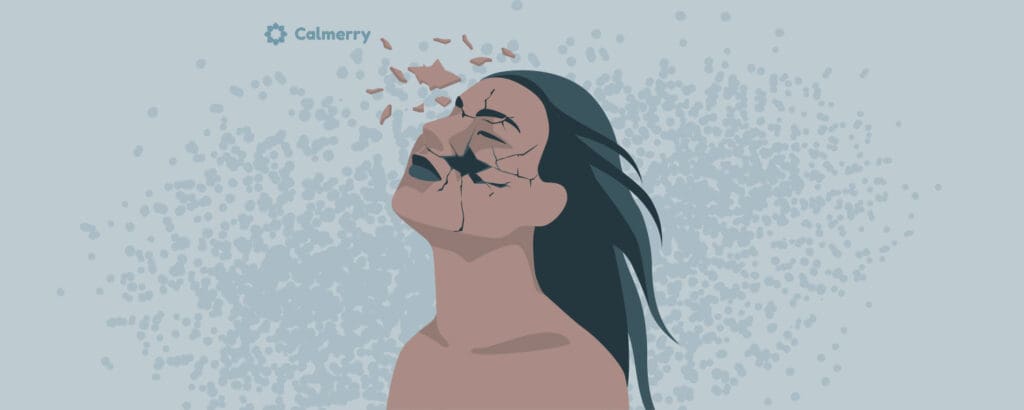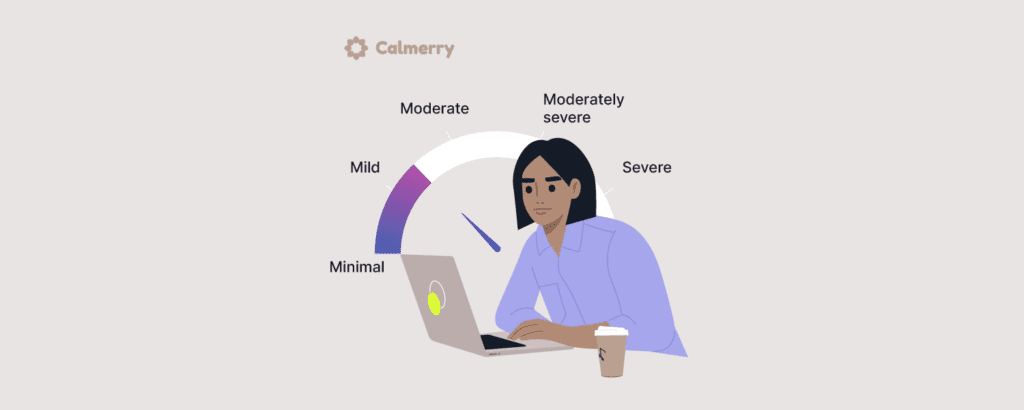The Mental Health Effects of Chronic Pain and How to Manage Them

In this article
If you have chronic pain, you are not alone. In the United States, over 20% of adults have chronic pain. Its risk tends to increase as you get older, but it is certainly not only a disease of the elderly and can affect people of all ages.
The experience of discomfort is unpleasant on its own, but having pain long-term can begin to impact your mental health too.
Talking with someone about the effects of chronic pain on mental health can help you understand more about the link between your body and mind. This may assist you in putting coping strategies in place to help manage your pain and improve your mental health.
Chronic pain and mental health
According to the American Psychiatric Association, “people living with chronic pain are at heightened risk for mental health problems, including depression [and] anxiety.”
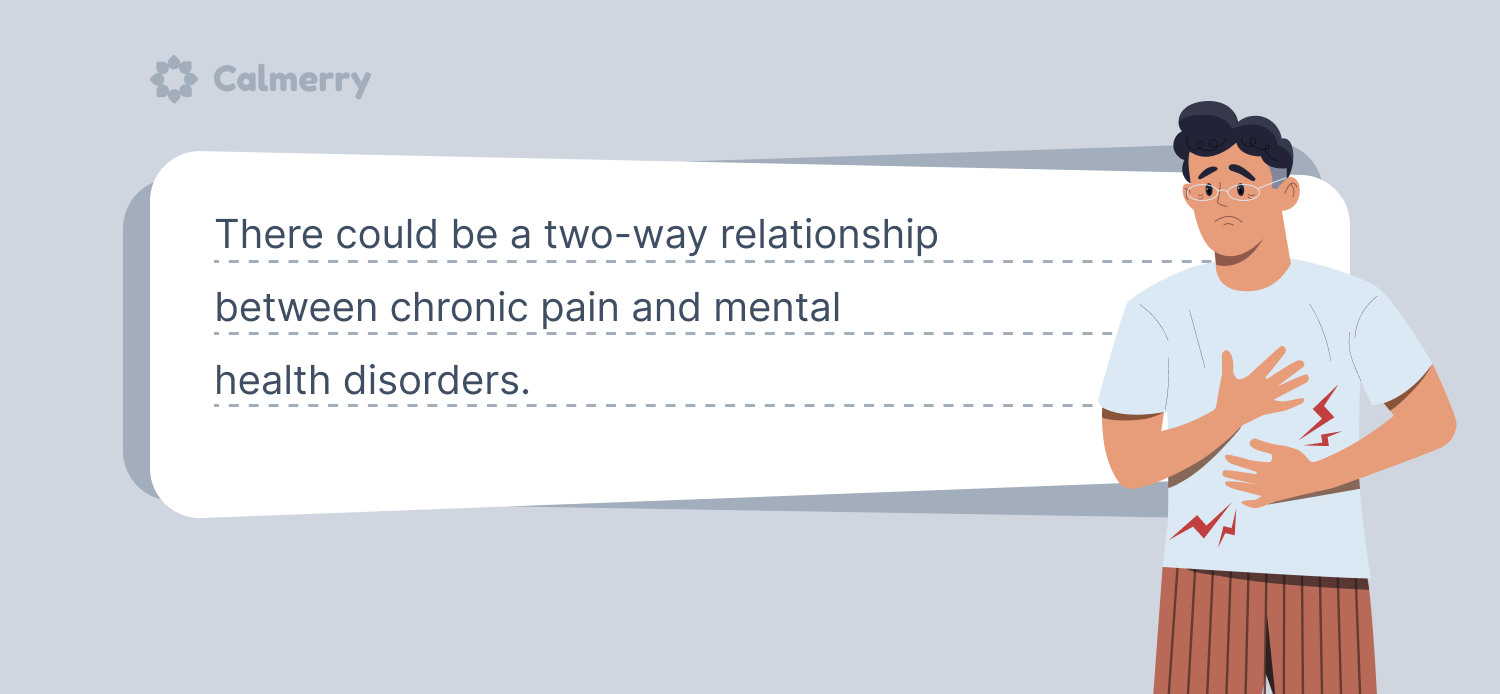
In fact, around 35-45% of individuals will experience depression from chronic pain.
Having persistent pain can understandably cause frustration, irritation and lower your mood. However, pain management physician W. Michael Hooten has suggested that there could be a two-way relationship between chronic pain and mental health disorders. His study, which included specialist brain scans, found that the two conditions shared similar neurological pathways.
The neural connectivity between pain and mental health could mean that having low mood, or depression, increases sensitivity to pain. With depression increasing the perception of pain, and pain then leading to low mood, a vicious cycle can sadly occur.
Can chronic pain cause anxiety?
Anxiety is common in all forms of chronic illness, and chronic pain is no exception. It is not always easy to tell if you are feeling stressed or anxious, but anxiety can cause a range of emotional and physical symptoms, including:
- Feeling worried or apprehensive in general
- Feeling more nervous than usual about work, socialising or leaving the house
- More headaches than usual
- Muscle tension
- Feeling sore all over your body
- Noticing your heart racing
- Feeling sick
- Having difficulty sleeping
In the same way that depression and chronic pain share pathways within the brain, anxiety and chronic pain co-exist, too.
Having anxiety may mean you:
- Have a lower tolerance for pain
- Worry more about the cause of your pain and the implications for the future
- Feel apprehensive about taking medications to treat the pain
Living with chronic pain
Researchers agree that chronic pain can be diagnosed when pain is still being experienced after the time when the normal healing processes would usually complete.
Healing is usually accepted to take up to 12 weeks. In the absence of other factors that slow healing, such as a wound infection or another illness, if you have pain that has lasted for 3 or more months, you may have chronic pain.
Causes of chronic pain
There can be many causes of chronic pain, including:
- Arthritis
- Headaches or migraines
- Low back pain
- Cancer-related pain
- Injuries and accidents
- Diabetes
- Neurological conditions, including MS and fibromyalgia
- Digestive tract conditions, including inflammatory bowel disease, irritable bowel syndrome, reflux or ulcers
- Trapped nerve pain
- Longstanding post-operative pain
Chronic pain and sleep
Living with chronic pain can be particularly upsetting. Day to day, you may feel very uncomfortable and find it difficult to concentrate due to persistent pain.
You may also notice sleep problems and fatigue caused by your discomfort. If you do not sleep well, you may feel grumpy and irritable the following day, which can further exacerbate feelings of frustration.
Chronic pain and employment
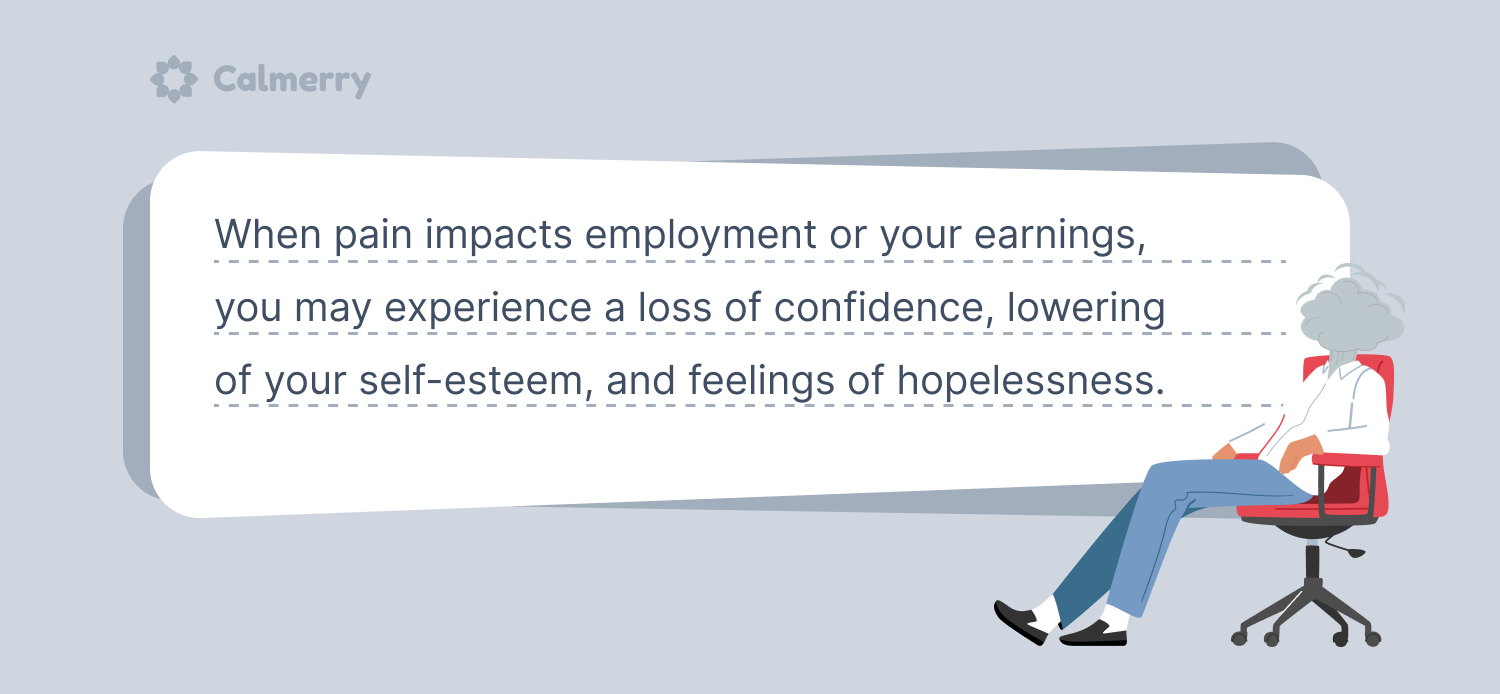
Pain has a far-reaching impact, and if it affects your ability to work, you may find:
- You no longer feel able to hold down a full-time job
- Your earnings may fall or cease altogether
- You may not be able to afford the same standard of living
When pain impacts employment or your earnings, you may experience a loss of confidence, lowering of your self-esteem, and feelings of hopelessness.
Chronic pain and exercise
If you have longstanding pain, it can feel very difficult to stay active. Whereas you may have walked or cycled locally before, you may now prefer to drive or use a bus service.
With the avoidance of exercise, you lose the positive mental and physical benefits of being active and may also be at risk of gaining weight.
Becoming heavier could make your discomfort worse, especially if you have pain in a weight-bearing joint such as your ankle, knee or hip.
Unfortunately, the additional pain caused by extra weight can then make it even harder to exercise, setting up a further vicious cycle.
Red flags of declining mental health
With chronic pain affecting multiple facets of your life, it is important to be aware of the ‘red flags’ of declining mental health. These are signs that your pain is causing increased stress levels, anxiety, depression, or the development of another mental illness.
You should seek medical advice if you notice any of the following red flags:
- Having severely low mood that makes you feel hopeless, or that life is worthless
- Regularly being tearful
- Withdrawing from others because you can’t face seeing them
- Experiencing ruminations or obsessive thoughts, such as dwelling on negative thoughts, overthinking a problem, or being unable to switch your mind off
- Having thoughts of harming yourself
- Taking more medication than your doctor has prescribed
- Feeling that life is not worth living, or experiencing suicidal ideations
How to manage depression and chronic pain
Although chronic pain can lead to depression, there are coping strategies you can try that will help you manage the mental health effects of pain.
Speak to your doctor
If you have chronic pain, your initial priority should be to manage the source of pain. Depending on the cause of your pain, your doctor may recommend the following:
- Physiotherapy
- Pain relief medications
- Supports or a brace
- Mobility aids
- Orthotic devices such as specialist insoles
- Surgical procedures
- Trying counseling
Depending on the cause of your pain, trying new medication may help. If you have diabetes or inflammatory bowel disease, for example, finding medications that offer better control of the disease may help to reduce discomfort and other symptoms.
Access counseling
Talk therapy or counseling can be particularly beneficial for those managing depression, stress and chronic pain. A trained Calmerry therapist can help you find ways to cope with the emotional impact of physical pain.
Counseling can take place in-person or online, which can make it easier to access.
A counselor can help you work through:
- The impact of the pain
- Your emotional response to chronic pain
- Any relationship difficulties that might be occurring as a result of chronic pain or the limitations it causes
- Low self-esteem, poor motivation or feelings of hopelessness
- Changes you have noticed in your body, such as increased weight, reduced fitness, appetite fluctuations and feelings around body image
Practice self-care
When you experience pain every day, it can be easy to get caught in the cycle of pain and low mood. Taking your first steps towards self-care may help you to break this cycle.
If taking care of your own needs is not something you regularly do, you may find it helpful to try:
- Writing your thoughts down in a journal
- Making a list of positive affirmations, such as ‘I am strong’, or ‘I am kind’
- Trying a guided meditation using a mindfulness app
- Taking a long soak in a warm bath – this may help to ease the physical pain and help your mind unwind, too
- Going for a walk in nature if possible
- Starting a new art project
- Reading a novel
- Calling a friend for a chat
Activities that support self-care will vary from person to person. So think about which forms of self-care you would enjoy, and give each one a go to see if putting yourself first helps to lift your mood or ease your discomfort.
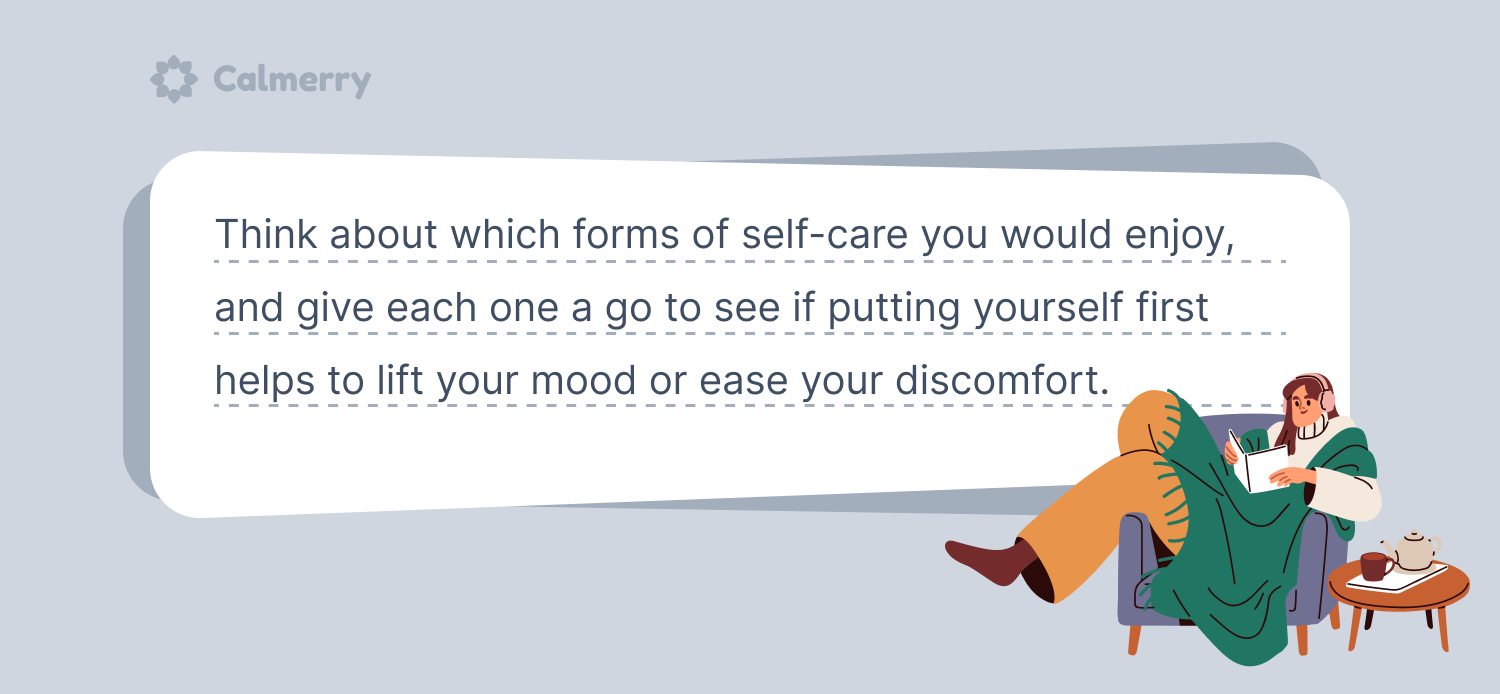
Get active
It is easy to fall into the trap of thinking you can’t exercise when you have pain. However, if walking or jogging is too painful, you could consider a non-weight-bearing exercise such as swimming or an aqua class to raise your heart rate without putting strain on your joints.
After exercising, you are likely to feel a rush of positivity which may reduce your stress levels and help counteract the negative mental health effects of pain.
Prioritize sleep
Sleep can be greatly impacted by pain. To get a good night’s sleep, you may find it helpful to:
- Check if your mattress is still supportive – a new mattress will provide more support than an old one
- Use pillows, blankets or supports to get into a more comfortable sleeping position
- Take pain relief before bed if needed
- Avoid using screens, drinking caffeine or consuming alcohol before bed
- Stick to a sleep schedule by going to bed and waking up at the same time each day.
Final thoughts
Pain and mental health are closely linked neurologically, so it is common to experience depression and anxiety with chronic pain. The mental health effects of chronic pain can greatly reduce your confidence and your quality of life.
Once you have recognized that chronic pain is affecting your mental health, there are several steps you can take to begin breaking the cycle of pain and depression or anxiety.
Ensure you speak to your doctor and access support from a counselor who can help you manage the way you are feeling. In addition, consider acts of self-care, prioritizing sleep and trying to ease back into physical activity to begin taking care of both your physical and mental well-being.
online therapy
live video session
